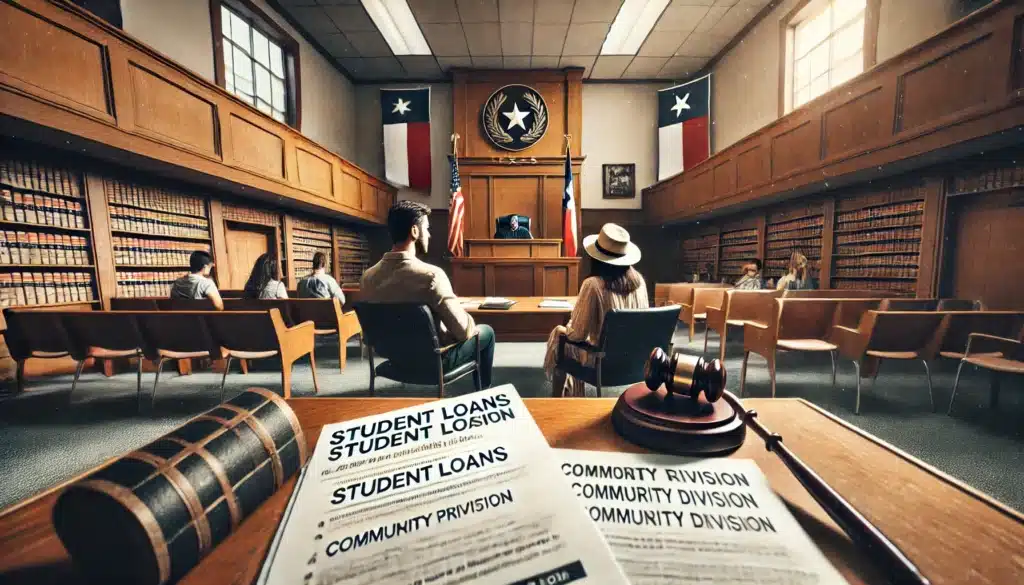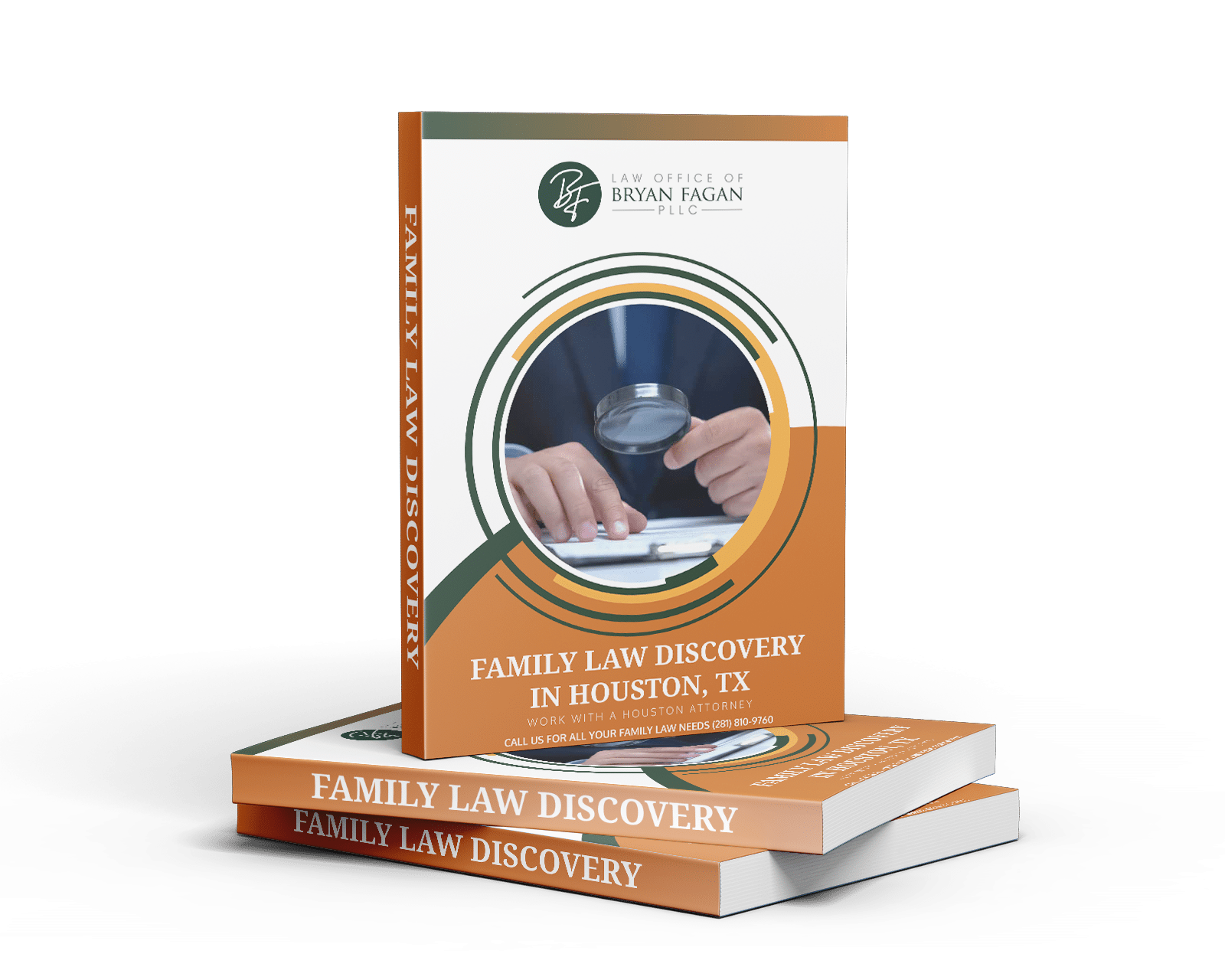
Picture this: You’re enjoying a casual game of tennis when your opponent unexpectedly shifts the conversation to their complicated divorce. “I just found out I might have to share my student loans with my ex,” they say, catching their breath between serves. “How are student loans handled in a Texas divorce?” they inquire, clearly perplexed. You take a moment, racket poised, prepared to explore this intriguing subject.
Here’s the short answer: Yes, student loans acquired during marriage can be treated as shared debt in Texas. But don’t drop your racket just yet! The story is filled with twists and volleys. Many factors influence how student loan debt is divided. These include the precise timing of the loans and determining who truly benefited from the education.
So, why keep reading? We’re breaking down the complexities of Texas community property laws. We’ll share real-life anecdotes to make things hit home, and offer smart tips for managing debt post-divorce. Whether you’re facing this challenge yourself or simply want to be prepared, this guide has everything you need to master the court of student loan debt in a Texas divorce. So, grab your gear, get ready, and let’s ace this topic together!
Key Takeaways
- In Texas, student loan debt incurred during marriage is typically considered community property and may be divided equally between spouses upon divorce.
- Factors such as the timing of when student loans were taken out and the beneficiary of the education funded by the loans significantly influence how student loan debt is divided during a Texas divorce.
- Prenuptial and postnuptial agreements can predetermine the division of student loan debt, potentially simplifying the process and reducing disputes during a divorce.
Understanding Community Property in Texas
How Are Student Loans Handled in a Texas Divorce and How Are Student Loans Divided in a Texas Divorce? Texas is one of nine states that follow community property jurisdiction. This means most property owned during marriage is equally owned by both spouses. This framework encompasses most assets and debts, including community property assets, save for some exemptions.
According to Texas law, property and debts accrued during the marriage constitute the community estate. Typically, this estate is split equally upon divorce. This means that student loan debt taken out during the marriage may also be classified as community debt. Importantly, this classification applies regardless of whose name is on the loan.
The Texas Family Code, Chapter 3, outlines marital property rights and liabilities, defining the difference between separate and community property. Separate property comprises assets and debts acquired before marriage, or through gift, devise, or descent during the marriage. This property is not subject to division in the event of divorce. Community property consists of everything else acquired during the marriage, including student loans. Debts incurred during the marriage are generally considered joint responsibilities. This means that both spouses may be held accountable for student loan debt accrued during the marriage.
Bear in mind that although community property laws generally lead to an equal division of debts, there are subtle differences. For example, community property solely controlled by one spouse may not be subject to the other spouse’s debts. Grasping these distinctions is vital in maneuvering through property division in a Texas divorce, especially when student loans are involved.

Factors Influencing Student Loan Division
How Are Student Loans Handled in a Texas Divorce and Can I Be Held Responsible for My Spouse’s Student Loan Debt?
Several factors can significantly impact how student loan debt is divided during a Texas divorce. The timing of when the loans were taken out is a key consideration. Additionally, the beneficiary of the education funded by the loans is also important. It’s vital to understand these elements to ensure an equitable division of debt that reflects the unique circumstances of each case.
Student loan debt incurred before marriage is typically considered separate debt. However, student debt taken out during the marriage is often classified as community debt. Moreover, if the education funded by the student loans contributed to the household income through better employment opportunities, the debt may be seen as marital debt. Courts also consider the overall standard of living and whether the education benefited the couple jointly.
Understanding these elements is crucial to ensure a fair and equitable division of student loan debt in a Texas divorce. We’ll further explore these factors in the subsequent subsections.

Timing of Loans
The timing of when student loans are incurred plays a critical role in their classification as separate or community debt. In Texas, student loans obtained before marriage are considered separate debt. Generally, the individual who took on the loan is responsible for it. The Texas Family Code classifies debt incurred before marriage as separate debt. It means it remains solely the responsibility of the individual spouse.
Loans taken during the marriage, however, are often classified as community debt if they benefit both spouses. For example, if the student loans funded a degree that resulted in higher household income, the debt might be considered jointly owned. It’s important to note that even if only one spouse’s name is on the loan, the funds acquired during the marriage may be treated as community debt.
This differentiation is pivotal during debt division in a Texas divorce. If a couple co-signed or refinanced student loans together during the marriage, the responsibility for repayment may be shared, complicating the division process. Understanding these timing aspects can aid in securing a just and balanced division of student loan debt.
Beneficiary of Education
How Are Student Loans Handled in a Texas Divorce and Educational Resources for Upper Kirby are essential topics to understand when navigating divorce proceedings. A crucial factor in dividing student loan debt is determining who benefited from the education funded by the loans. Courts consider whether the education contributed to the couple’s overall standard of living and financial stability. If the education funded by student loans led to a higher-paying job and improved the household’s financial situation, the debt may be considered shared.
For instance, if one spouse’s education significantly increased their income, benefiting the couple’s lifestyle, the court might view the student loan debt as a shared responsibility. Courts also assess whether the education funded by the student loans contributed to the couple’s overall standard of living. This means that if the education improved the family’s financial situation, the debt might be seen as a communal obligation.
Additionally, a spouse who left school to support the family might have the other spouse partially repay their student loan debt. Such considerations play a key role in ensuring that the division of student loan debt during a divorce reflects the financial contributions and advantages of each spouse. Understanding these nuances is vital for an equitable resolution.
Criteria Used by Texas Courts
When it comes to dividing student loan debt in a Texas divorce, courts use specific criteria to determine responsibility. The Texas Family Code, particularly Chapter 7, governs property division during divorce, specifying the rules for both separate and community property. The first step for Texas courts is to determine whether a student loan is a community or separate debt.
Clear and convincing evidence is required to prove that a student loan is separate property and not part of the community estate. If a student loan debt is deemed separate, it is typically the sole responsibility of the spouse who incurred it. Conversely, if the loan is considered community debt, the court will distribute it based on what is fair given the facts of the case.
It’s important to note that the court may not divide community debt equally; the division depends on each spouse’s economic situation and the benefits derived from the debt. Student loan debts considered as community debt will impact the overall division of the community estate. Comprehending these criteria is indispensable for anyone undergoing a Texas divorce with student loans.

The Role of Prenuptial and Postnuptial Agreements
Prenuptial and postnuptial agreements can play a significant role in how student loan debt is divided in a Texas divorce. These agreements enable couples to outline the division of assets and liabilities, including student loans, in the event of divorce. Texas courts generally uphold these agreements. However, this is contingent upon the agreements being entered into freely and with full disclosure of all assets and liabilities.
Prenuptial agreements, made before marriage, can specify how student loan debt will be handled. Similarly, postnuptial agreements made after marriage can dictate the division of student loan debt, provided they meet legal standards and are entered into voluntarily. To be valid, these agreements must be formalized in writing. They must also disclose all assets and liabilities and ensure fairness to both parties.
A legally binding prenuptial or postnuptial agreement can help predetermine debt division, ensuring that each spouse is responsible for their own student loan debt. Such agreements can bring clarity and lessen disputes during the divorce process, facilitating a smoother transition for both parties.
Managing Student Loan Debt Post-Divorce
Managing student loan debt post-divorce can be challenging, but there are several strategies to consider. Income-driven repayment plans, such as Income-Based Repayment (IBR) and Pay As You Earn (PAYE), can help by capping monthly payments at a percentage of the borrower’s discretionary income. Revising income information to reflect post-divorce earnings can potentially lower monthly student loan obligations.
After a divorce, refinancing private student loans can provide opportunities to secure improved interest rates and loan terms. This may help in managing the loans more effectively. This option can help individuals manage their financial obligations more effectively by seeking more favorable loan conditions. Additionally, temporary relief options like forbearance and deferment can pause or reduce student loan payments, providing some breathing room during the transition period.
However, it’s important to note that interest may continue to accrue during forbearance, possibly increasing the total amount owed. Examining these alternatives can aid individuals in better handling their student loan debt post-divorce.

The Importance of Legal Counsel
Understanding How Are Student Loans Handled in a Texas Divorce is crucial, and seeking advice from a family law attorney in Texas is vital to guarantee an equitable division of student loan debt during a divorce. Legal counsel can assist in presenting clear and convincing evidence to support claims about the nature of student loan debt. Attorneys can guide clients through mediation sessions, providing a cost-effective alternative to court decisions regarding student loan debt.
A family law attorney can help navigate the complexities of Texas law, ensuring that your legal rights are protected throughout the divorce process. Their expertise can make a significant difference in achieving equitable outcomes in the division of student loan debt.
Resources and Support for Divorcing Couples
Professional assistance and resources exist to aid divorcing couples in managing the division of student loan debt. Consulting with experienced legal professionals can provide clarity and equitable outcomes for dividing student loan debt in divorce. Attorneys, such as those at the Law Office of Bryan Fagan, PLLC, offer personalized guidance to handle student loan debt division in Texas divorces.
Mediation can be a cost-effective alternative for divorcing couples to settle student loan debt issues outside of court. Professional help can considerably influence the management of student loan debt division during a divorce, securing a just and balanced settlement for both parties.
Real-Life Examples and Case Studies
Real-life examples and case studies provide valuable insights into What Happens To a VA Loan After Divorce? and The Truth About Suing Schools For Bullying. These examples reveal contributing factors like the timing of incurring the loan and the beneficiary of the education. Case studies on specific divorce scenarios help provide deeper insights into how courts have handled student loan debt division based on factors such as income levels, contributions to household expenses, and the existence of prenuptial or postnuptial agreements.
Testimonials from individuals who have experienced divorce in Texas offer personal perspectives on the challenges and resolutions surrounding student loan debt division. These real-life stories can help others understand the complexities and potential outcomes of their own situations.
For more information on How Are Student Loans Handled in a Texas Divorce, contact the Law Office of Bryan Fagan, PLLC. Our experienced attorneys are here to guide you through every step of your divorce, ensuring you achieve the best possible outcome.
Conclusion:
Navigating how student loans are handled in a Texas divorce can feel like playing a game of financial Jenga—one misstep, and everything could come crashing down. However, with the right knowledge, you can tilt the odds in your favor.
Think of this process as a road trip. While you may encounter some bumps along the way, having a reliable map—like this helpful guide—will help you reach your destination smoothly. Take inspiration from Jane and John, who transformed their divorce into a valuable learning experience. Their journey illustrates that even the most complicated financial situations can be untangled with patience and the right assistance.
Understanding community property laws, timing your loan considerations appropriately, and determining who can claim the student loan interest deduction are all critical factors. Staying informed and proactive is essential. Additionally, enlisting the help of a knowledgeable attorney acts like your personal GPS, guiding you through the legal complexities.
So, the next time you find yourself at your favorite café, overhearing another dramatic divorce story, you’ll be the one nodding in understanding. “Ah, student loans,” you’ll say with a knowing smile. “I know how those are handled in a Texas divorce.” Now, go ahead, finish that coffee, and tackle the world—one student loan at a time!
Other Related Articles
- Untangling student loans in a Texas divorce
- Navigating Student Loan Debt in a Texas Divorce: What You Need to Know
- Understanding Student Loan Division in Texas Divorce: What You Need to Know
- What Exactly is involved in the estate planning process?
- How is marital property defined?
- Premarital agreements- a unique plan for your marriage?
- The Role of Negotiations in a Texas Divorce
- Rebuilding Your Credit After Divorce
- Why getting a prenuptial agreement will protect your assets
- How to untangle your debts during divorce
FAQ – Student Loans in Texas Divorce
In Texas, student loan debt acquired during the marriage is typically considered community property. It may be divided equally between spouses upon divorce.
If the student loans were taken out during the marriage, they may be considered community property. This makes you potentially responsible for part of the debt.
Yes, if the loans were incurred during the marriage, they are likely to be considered community property. Your husband could be held responsible for a portion of the debt.
In Texas, any debt incurred during the marriage is generally considered community property. This means it could be shared between spouses upon divorce.
Yes, student loans taken out during the marriage are usually considered community property in Texas.
If the student loan debt was incurred during the marriage, you might be responsible for part of it in a divorce. However, you do not inherit student loan debt incurred before the marriage.
If the debt was incurred during the marriage, it could be considered community property, making you responsible for a portion of it upon divorce.
No, student loans are individual liabilities, and only the borrower’s wages can be garnished for repayment.
Yes, if you are on an income-driven repayment plan and file taxes jointly, your husband’s income will be considered in calculating your repayment amount.





